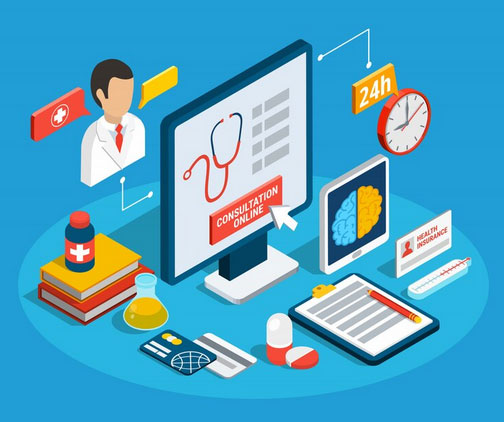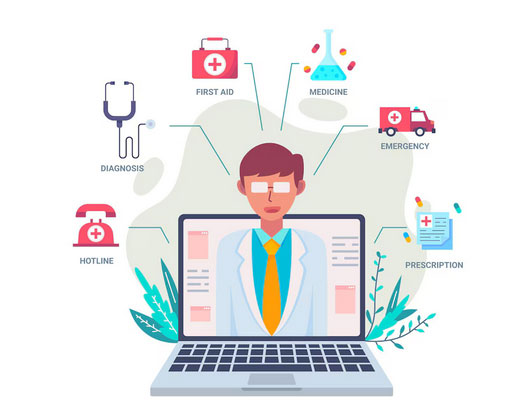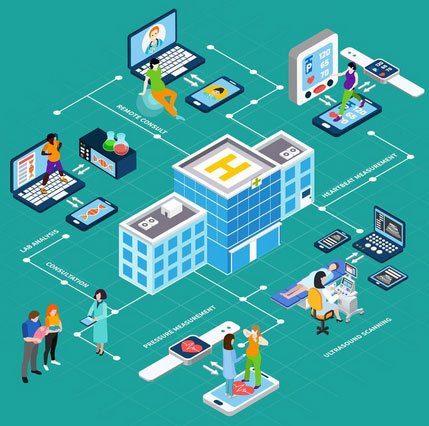Benefits Of Hospital Management System: Advantages And Cost Analysis
Healthcare is the most basic and important aspect of a society that cannot be ignored. Yet, hospitals and patients both face a lot of challenges in accessing quality and timely care.
Nearly 60% of healthcare providers struggle with fragmented data and operational inefficiencies. This leads to administrative overload, which detracts from the focus on actual care. Besides, the lack of a proper channel also impacts the patient-doctor relationship.
A Hospital Management Systems (HMS) address these pain points by offering practical solutions to streamline these operations, helping healthcare professionals work more efficiently while enhancing patient outcomes.
In this blog, we will explore 10+ benefits of the hospital management system and how it can transform the patient experience and hospital administration.

Benefits Of Hospital Management System
1. Increased Operational Efficiency
Before HMS, all the tasks, such as appointment scheduling, billing, and inventory management, were done manually. This was not only time-consuming but also mentally draining. With HMS, all these tasks were done online with minimum human intervention. Implementing HMS benefits hospitals with:
Smart patient flow management
Reduced operational costs
Enhanced staff productivity
Minimized billing errors
One-click digital billing and insurance verification
Improved patient satisfaction
By automating routine tasks, the hospital management system transforms hospitals from bureaucratic environments into patient-centered healing spaces.
2. Improved Patient Care and Health Outcomes
An HMS enables healthcare providers to access a centralized view of a patient’s medical records, test results, and treatment history in actual time. By connecting doctors, nurses, and specialists on a single platform, an HMS supports seamless collaboration and health outcomes. These include:
Doctors making faster decisions
Patients receiving more precise treatments
Personalized medication and aftercare
Saves critical time during medical emergencies
Thus, an HMS isn't just about technology—it gives healthcare professionals the freedom to focus on what truly matters: patient care.
3. Business Continuity and Disaster Recovery
In case of unexpected events like natural disasters or technical failures, a Health Management System (HMS) keeps operation intact by:
Securing Data Storage - HMS keeps important patient and operational data safe in a secure location so it won’t be lost during disruptions.
Granting Remote Access- Staff can access the system from anywhere, allowing them to continue their work even if they can’t be at the facility.
Adapting to Workflows- The system supports alternative workflows so staff can easily adjust to new working methods during emergencies.
4. Enhanced Security for Hospital Data
In the age of cyber hacking and healthcare data breaches, building trust is important. A HMS comes with data encryption, security audits, and access controls to protect patient information. Data encryption keeps the records and other personal information of patients safe. Besides, unlike paperwork, not everyone can access confidential information. Thanks to authorized controls in the system.
5. Reduction in Medical Errors
Humans are prone to make mistakes. Thus, a manual system can’t guarantee 100% accuracy. However, automated systems like HMIS can help. Installing an HMIS not only foolproofs the data but also frees up the staff from tedious tasks like data entry.
6. Improved Financial Performance
By automating billing, managing resources more effectively, and tracking inventory, hospitals reduce unnecessary spending and speed up revenue collection. This cost-effective approach allows healthcare providers to reinvest savings into areas like patient care and technology upgrades. This increases the likelihood of referrals, which positively impacts revenue.
7. Advanced Reporting and Analytics
One of the standout benefits of an HMS is its powerful reporting and data analytics capabilities. The system generates automated reports with just a few clicks. An HMS empowers healthcare providers to make in-time decisions by providing data on:
Patient care
Stats on diseases
Resource use
Prescription records
Treatment outcomes
8. Better Resource Allocation
With HMIS, the management can track inventory levels in real-time. For instance, if supplies for heart surgeries run low, the system sends alert notifications to reorder in advance. This proactive management prevents shortages and ensures that hospitals are prepared to handle patient demand.
9. Facilitated Communication and Team Collaboration
An HMS provides a shared platform for interdepartmental communication. On this centralized portal, healthcare providers can access and update patient information in real-time. This transparency fosters teamwork across departments, ensuring coordinated care and reducing the chances of miscommunication or duplicated efforts.
10. Simplified Regulatory Compliance and Accreditation
Regulatory compliance involves adhering to numerous local, state, and federal guidelines. This can be complex and resource-intensive. HMS makes it easier by:
Centralizing data tracking and documentation- HMIS automates the monitoring of compliance with regulations, ensuring that all necessary protocols are consistently followed.
Sending Proactive Alerts - HMIS can send alerts for upcoming regulatory deadlines or required updates, which helps healthcare organizations stay ahead of compliance requirements and avoid potential penalties.
Enhancing Data Integrity- Centralized data repositories provide accurate and easily accessible information for audits.
Generating Real-Time Reporting- The system can generate detailed reports automatically, providing the necessary documentation for audits and assessments.
11. Streamlined Population Health Management
An HMS helps healthcare providers understand population health trends by collecting, tracking, and analyzing data. This includes information on who patients are, how they respond to treatments and common health issues.
With this data, hospitals can create specific programs to improve health, such as preventive care initiatives and and chronic disease management.
12. Improved Clinical Decision-Making
With easy access to comprehensive patient data, clinical decision-making becomes faster and more accurate. For example, a physician can instantly see a patient's allergy history when considering a treatment plan, minimizing the risk of adverse reactions.
Why Is A Hospital Management System Important For Modern Healthcare?
A study by Forbes shows that doctors have to spend nearly ⅔ of their time doing paperwork. Is this the best use of a doctor's ability? And if we consider a multi-speciality hospital, we have hundreds or maybe more patients who visit each day. This is also a waste of time for patients seeking the best medical expertise.
Not only is manual recording time-consuming, but it is also tedious and can lead to errors. Besides, the privacy of patient details is also a critical concern.
High paperwork, overburden on staff, lack of privacy, and chances of human mistakes are a few reasons that call for a Hospital Management System (HMS) in healthcare.
In a healthcare world where precision and efficiency can directly impact lives, having a smart, tech-enabled system is a must. Henceforth, a HMS system is important as it provides:
Effortless Patient Data Management
An HMIS system collects, retrieves, and records every detail of a patient's journey, i.e.
Patient enrollment
Medical History
Patient test reports
Ongoing treatment plans
Everything is recorded in one centralized system. So, when Mr Sharma visits for a routine check-up, doctors can instantly pull up his entire history. No files, no searching, just one click.
Streamlined Communication Across Departments
A reliable healthcare management software is like a brain of the nervous system. It connects departments like the lab, pharmacy, and billing in real-time, so everyone is on the same page.
If Mr Sharma, from our last example, has some tests done and the results are out, then the doctor, the patient (Mr Sharma) and the pharmacy all get notified instantly.
Simplified Billing and Insurance Processing
Hospitals often face challenges in managing finances and billing efficiently. An HMS takes over by automating invoicing and insurance claims, reducing errors and delays.
For patients, this means fewer billing headaches and a smoother exit after treatment.
Enhanced Healthcare Delivery
In emergencies, every second counts. An HMS allows medical teams to communicate within a snap second so that patient care is timely and efficient. Imagine if all patient records, including allergies and medication history, were accessible to ER doctors in moments—it can be lifesaving.

Cost Benefit Analysis For Hospital Management System
Before implementing a HMS, one must weigh down the expenditure and returns. Here is a cost benefit analysis for hospital management system (HMS):
Initial Investment vs. Long-Term Gains
Implementing an HMS involves initial costs like:
Customization costs to fit specific hospital needs or integrating with existing systems (e.g., EMR or PACS)
Operational costslike maintenance, updates, bug fixes, and user support
Hardware infrastructure like barcode scanners, biometrics, electrical medical records (EMR) system
Staff training to ensure everyone can effectively use the new system
Regulatory compliance costs specific to the nation.
But, these costs are nothing but long-term investments that reap following benefits:
Enhanced Resource Allocation for Improved Saving
A well-implemented HMS provides hospitals with insights into resource utilization, allowing for better planning and allocation. For example, by tracking patient flow and bed occupancy in real-time, hospitals can optimize staff deployment and reduce unnecessary expenditures. The efficient use of resources directly impacts operational costs, leading to substantial savings over time.
Long-Term Financial Returns
Patients today expect fast, convenient healthcare services. An HMS enhances the patient experience by offering patient portals for easy access to medical records, test results, and communication with providers. Shorter wait times and efficient appointments further contribute to a positive experience, making patients feel more engaged and cared for.
The cost-benefit analysis shows that while the initial setup of a Hospital Management System involves initial investment, the benefits justify the cost.
What Is The Best Hospital Management System
Now you know how important a hospital management system is, given its manifold benefits. So, when choosing an ERP based hospital management software, you need to consider a software that works best for your hospital/ clinic.
Hospital Management System(HMS) by Ekklavya is India’s leading hospital and healthcare automation system. It is a full-fledged solution which automates every administrative and communication work related to healthcare like:
Patient Management for records and medical history
Hospital OT and Bed Management
Laboratory Management for lab tests and investigations
Ambulance Management
Drugstore Inventory Management for medicines and equipment stock records
Blood Bank Management
Billing for patients
Patient Communication and feedback
Insurance Claim submissions and tracking
Admission/Discharge/Transfer Management
With 30 years of offering customised IT and healthcare solutions, we understand the nuances of the healthcare industry. We owe our goodwill to simplicity and ease of convenience in our solutions. You can trust Ekklavya with only the best automation solutions customized to your needs.
Here are the top reasons to convince you why Eklavya is the best choice for HMS:
1. Streamlined Operations - Our cloud-based software covers all the administrative activities of your hospital/clinic.
2. User-Friendly Interface - Our intuitive design ensures that staff can easily navigate the system, reducing training time and improving efficiency.
3. E-Billing Invoices - Ekklavya’s HMS Simplifies the billing process and reduces paperwork by generating and managing invoices electronically.
4. Easily Scalable - Our system grows with your needs, whether you're expanding services or adding new facilities.
5. Light on Your Pockets - Cost-effective solutions that fit your budget.
6. Strong Data Security - Keeps patient information secure with robust encryption and data protection.
6. 24/7 IT Team Support - Our support team is always ready to help with technical issues.
By choosing Eklavya, you sign up for a reliable, efficient, and comprehensive management system tailored to your healthcare needs.
For more expert guidance, book a FREE Consulation Call, and our team will revert you.
What Is The Future Scope Of Hospital Management Systems?
With advancements in the field of IT (Information Technology), there have been updates in the healthcare management information systems.
Some emerging trends include:
AI and Machine Learning Integration - AI-driven insights can improve diagnostics, automate administrative tasks, and enhance patient care.
Telemedicine - HMS now supports remote consultations where patients can be monitored from distance. This has expanded the access to healthcare and streamlined patient-doctor interactions.
IoT Integration - Internet of Things (IoT) devices will improve patient monitoring and streamline equipment management.

Frequently Asked Questions About Benefits Of Hospital
Hospital management system benefits include automating all hospital work, such as patient records, appointment scheduling, and doctor-patient communication. HMS also helps reduce human errors, facilitates easy processing of medical records, and improves work efficiency.
The short answer is yes. By implementing role-based access control (RBAC), regularly updating the security protocols, training the staff, and using cloud-based solutions, an HMIS can improve data security.